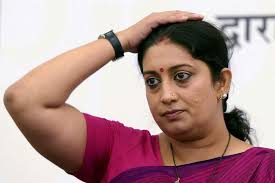New Delhi, Mar 16: The Election Commission and Delhi University (DU) were today directed by a court here to bring the documents related to records of educational qualification of Union HRD Minister Smriti Irani against whom a complaint was filed for allegedly giving false information in affidavits to the poll panel.
 Metropolitan Magistrate Harvinder Singh noted that in pursuance to court's earlier order, the representatives of the commission and the university have not brought the complete documents today and some additional papers were required in the case.
Metropolitan Magistrate Harvinder Singh noted that in pursuance to court's earlier order, the representatives of the commission and the university have not brought the complete documents today and some additional papers were required in the case.
The court has now fixed the matter for May 3 for further proceedings and asked the officials to bring complete documents on that day.
The court had on November 20 last year allowed the plea of the complainant seeking a direction to the officials of EC and DU to bring records of Irani's educational qualification after he said he was unable to place them before the court.
It, however, had declined the submission of complainant Ahmer Khan, a freelance writer, seeking direction to the CBSE to bring Irani's class 10th and 12th records.
The complainant had claimed in court that Irani had deliberately given discrepant information about her educational qualification in affidavits filed before the poll panel and not given any clarification despite concerns being raised on the issue.
Khan had alleged that Irani had knowingly furnished misleading information about her educational qualification in affidavits filed before EC and that a candidate deliberately giving incorrect details can be punished under the provisions of IPC and under section 125A of Representation of the People Act (RPA).
Section 125A of RPA deals with penalty for filing false affidavit and entails a jail term of upto six months or fine or both.
The court on June 24 last year had taken cognizance of the complaint which accused Irani of furnishing false information about her academic qualifications in the affidavits filed before the EC in 2004, 2011 and 2014.
The complainant had earlier claimed in court that in her affidavit for April 2004 Lok Sabha polls, Irani had said she completed her BA in 1996 from DU (School of Correspondence), whereas in another affidavit of July 11, 2011 to contest Rajya Sabha election from Gujarat, she had said her highest educational qualification was B.Com Part I from the School of Correspondence, DU.
The complaint also alleged that in the affidavit filed for nomination of April 16, 2014 Lok Sabha polls from Amethi constituency in Uttar Pradesh, Irani said she had completed Bachelor of Commerce Part-I from School of Open Learning, DU.





Comments
FAKE DEGREE CERTIFICATE
FAKE PROMISE
FAKE VIDEO CREATOR
FAKE GOVERNMENT THEY CAN GIVE ONLY PROMISE CAN NOT FULFILL THAT ...
EVEN IRANI NOW HAVE CERTIFICATE OHHH EDUCATION MINISTER ...
When an education minister forged document then what about normal person....she must have been the best example for every citizens of our country....Jai India...need to check feku's degree certificate too...???
Add new comment